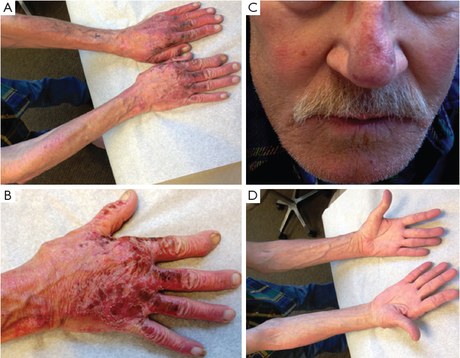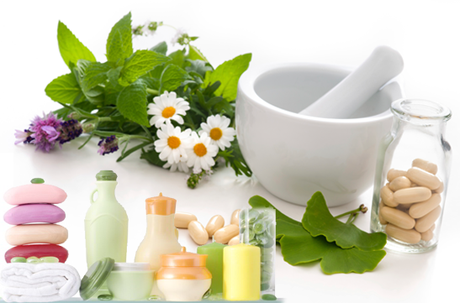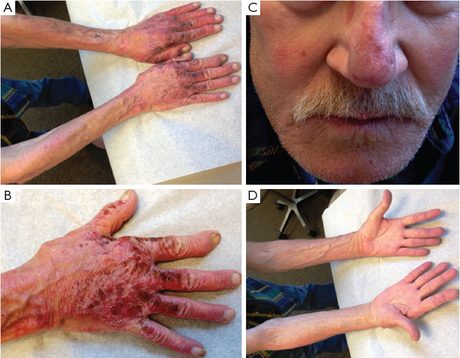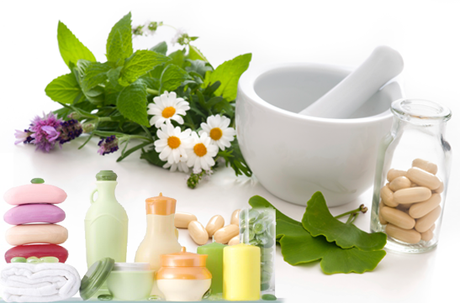Porphyria is a disorder that results from a build-up of natural chemical known as porphyrin in human body. Porphyrins are essential for the function of haemoglobin, a protein in the red blood cells that links to porphyrin, binds iron, and carries oxygen to the organs and tissues. High levels of porphyrins can cause significant problems. Porphyria mainly affects the nervous system and skin.

TYPES OF PORPHYRIA
Acute Porphyria primarily causes symptoms associated with nervous system. In some instances, it can cause symptoms in skin as well. These attacks rarely occur before individual reaches puberty and in menopausal females.
Cutaneous Porphyria causes skin symptoms due to oversensitivity to sunlight and it don't affect the nervous system.
CAUSES OF PORPHYRIA
- Genetic risks
- Certain drugs (barbiturates or sulfonamide antibiotics or, less often, birth control pills, or some drugs that affect the mind or behaviour, known as psychoactive drugs.
- Chemicals
- Dieting or fasting
- Smoking
- Physical stress, such as infections or other illnesses
- Liver disease
- Emotional stress
- Alcohol
- Menstrual hormones
- Sun exposure
- Excess iron
SYMPTOMS OF PORPHYRIA
- Abdominal pain, swelling
- Constipation or diarrhoea
- Insomnia
- Palpitations
- High blood pressure
- Anxiety or restlessness
- Seizures
- Mental changes, such as confusion, hallucinations, disorientation or paranoia
- Breathing problems
- Muscle pain, tingling, numbness, weakness or paralysis
COMPLICATIONS
- Dehydration
- Breathing difficulties and muscle weakness
- Low sodium in blood or Hyponatremia
- High blood pressure
- Chronic kidney failure
- Liver damage
- Permanent skin damage, abnormal appearance, scarring and colouring
- Paralysis, coma, respiratory failure, hair loss and gall stones

- Identify the things that may trigger the porphyria symptoms. Talk to your doctor about the type of porphyria and become familiar with possible symptom triggers and ways to avoid them.
- Cereal, porridge, rice pudding, milk shakes made with bananas nuts and seeds such as pumpkin seeds are extremely useful to deal with porphyria.
- Drink coconut water on regular basis.
- Prefer vegetables like bottle gourd, bitter melon, round gourd, ash gourd, ridge gourd, pumpkin etc.
- Prepare a fresh juice of carrots, green sour apples, grapefruits and cabbage. Drink 2 glasses of fresh juice daily for 6 months.
- Daily supplementation with beta-carotene (vitamin A) as part of long-term treatment is necessary.
- Avoid known triggers such as smoking, alcohol, and coffee, tea, dieting and fasting.
- Eat regular, low calorie meals and drink plenty of water to prevent dehydration.
- Avoid acidic foods and fruits. Eat green vegetables such as broccoli, cabbage. Also include beans, pulses and small amounts of dried fruits in the diet.
- Keep the foods as natural and organic as possible. Avoid processed foods, junk food and spicy-oily food. Aim to eat at least five portions of fruit and vegetables a day.
- Take a half-inch piece of root ginger and infuse it in a cup of hot water. Leave it for 5 to 10 minutes and then sip. To make it more palatable add a small teaspoon of honey to sweeten it. This infusion can be taken throughout the day. Flat ginger beer will also ease nausea.
- Prepare an infusion of Basil leaves in hot water since it acts as a natural tranquilliser. It is said to be a tonic and it also calms down the nervous system, aids digestion and eases stomach cramps and nausea.
- Fresh pineapple contains a digestive enzyme called, bromelain. This helps to digest proteins and speed along the process of digestion. Eat one or two slices of pineapple every day. Eat it preferably as a breakfast or before going to bed. It should be eaten at least two hours before or after the last or next meal.
- When out in the sun, wear sunglasses, a brimmed hat and long-sleeved clothes. Apply sunscreen to exposed skin areas.
- Protect your skin every day. Wear rubber gloves when handling chemicals or very hot water. Avoid perfumed soaps. Regularly apply barrier cream to the hands.
- Regular physical activity, yoga and meditation help to stimulate bowel movements. It will also relieve stress which is a main cause of porphyria. Walking is one of the best forms of exercise. Try to do some form of exercise every day for at least 20 minutes.
DR. Vikram Chauhan, MD - AYURVEDA is an expert ayurvedic doctor based in Chandigarh, India and doing his practice in Mohali, India. He is spreading the knowledge of Ayurveda - Ancient healing treatment, not only in India but also abroad. He is the CEO and Founder of Planet Ayurveda Products, Planet Ayurveda Clinic and Krishna Herbal Company. Write at - [email protected], Contact at - +91-172-521-4030 Websites - www.planetayurveda.com, www.alwaysayurveda.com
View more posts from this authorPorphyria is a disorder that results from a build-up of natural chemical known as porphyrin in human body. Porphyrins are essential for the function of haemoglobin, a protein in the red blood cells that links to porphyrin, binds iron, and carries oxygen to the organs and tissues. High levels of porphyrins can cause significant problems. Porphyria mainly affects the nervous system and skin.

TYPES OF PORPHYRIA
Acute Porphyria primarily causes symptoms associated with nervous system. In some instances, it can cause symptoms in skin as well. These attacks rarely occur before individual reaches puberty and in menopausal females.
Cutaneous Porphyria causes skin symptoms due to oversensitivity to sunlight and it don't affect the nervous system.
CAUSES OF PORPHYRIA
- Genetic risks
- Certain drugs (barbiturates or sulfonamide antibiotics or, less often, birth control pills, or some drugs that affect the mind or behaviour, known as psychoactive drugs.
- Chemicals
- Dieting or fasting
- Smoking
- Physical stress, such as infections or other illnesses
- Liver disease
- Emotional stress
- Alcohol
- Menstrual hormones
- Sun exposure
- Excess iron
SYMPTOMS OF PORPHYRIA
- Abdominal pain, swelling
- Constipation or diarrhoea
- Insomnia
- Palpitations
- High blood pressure
- Anxiety or restlessness
- Seizures
- Mental changes, such as confusion, hallucinations, disorientation or paranoia
- Breathing problems
- Muscle pain, tingling, numbness, weakness or paralysis
COMPLICATIONS
- Dehydration
- Breathing difficulties and muscle weakness
- Low sodium in blood or Hyponatremia
- High blood pressure
- Chronic kidney failure
- Liver damage
- Permanent skin damage, abnormal appearance, scarring and colouring
- Paralysis, coma, respiratory failure, hair loss and gall stones

- Identify the things that may trigger the porphyria symptoms. Talk to your doctor about the type of porphyria and become familiar with possible symptom triggers and ways to avoid them.
- Cereal, porridge, rice pudding, milk shakes made with bananas nuts and seeds such as pumpkin seeds are extremely useful to deal with porphyria.
- Drink coconut water on regular basis.
- Prefer vegetables like bottle gourd, bitter melon, round gourd, ash gourd, ridge gourd, pumpkin etc.
- Prepare a fresh juice of carrots, green sour apples, grapefruits and cabbage. Drink 2 glasses of fresh juice daily for 6 months.
- Daily supplementation with beta-carotene (vitamin A) as part of long-term treatment is necessary.
- Avoid known triggers such as smoking, alcohol, and coffee, tea, dieting and fasting.
- Eat regular, low calorie meals and drink plenty of water to prevent dehydration.
- Avoid acidic foods and fruits. Eat green vegetables such as broccoli, cabbage. Also include beans, pulses and small amounts of dried fruits in the diet.
- Keep the foods as natural and organic as possible. Avoid processed foods, junk food and spicy-oily food. Aim to eat at least five portions of fruit and vegetables a day.
- Take a half-inch piece of root ginger and infuse it in a cup of hot water. Leave it for 5 to 10 minutes and then sip. To make it more palatable add a small teaspoon of honey to sweeten it. This infusion can be taken throughout the day. Flat ginger beer will also ease nausea.
- Prepare an infusion of Basil leaves in hot water since it acts as a natural tranquilliser. It is said to be a tonic and it also calms down the nervous system, aids digestion and eases stomach cramps and nausea.
- Fresh pineapple contains a digestive enzyme called, bromelain. This helps to digest proteins and speed along the process of digestion. Eat one or two slices of pineapple every day. Eat it preferably as a breakfast or before going to bed. It should be eaten at least two hours before or after the last or next meal.
- When out in the sun, wear sunglasses, a brimmed hat and long-sleeved clothes. Apply sunscreen to exposed skin areas.
- Protect your skin every day. Wear rubber gloves when handling chemicals or very hot water. Avoid perfumed soaps. Regularly apply barrier cream to the hands.
- Regular physical activity, yoga and meditation help to stimulate bowel movements. It will also relieve stress which is a main cause of porphyria. Walking is one of the best forms of exercise. Try to do some form of exercise every day for at least 20 minutes.

